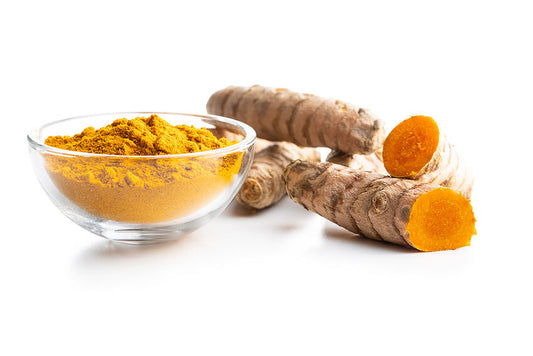You’ve probably heard before that calcium is the most important vitamin for bones, and that you need to drink your milk and eat your cheese for bone health.
While this is true to some extent, many vitamins play a role in your bone health, and you need to make sure you are getting enough of all of them in order to keep your bones and joints healthy.
As we age, our bones and joints start to deteriorate, so it’s important we keep them healthy to avoid any unnecessary problems.
You may be getting enough vitamins from food, but adding in a multivitamin is the best way to ensure that you're bridging all potential nutrient gaps for optimal health and wellbeing.
Vitamins and Minerals for Bones
Calcium
Again, this is the one most commonly known as it's vital for bone health! Calcium is found in milk, yogurt, cheese, and all other dairy products.
Calcium is important because it contributes to the strength of your bones. Your bones use calcium to continuously make new, stronger bone cells.1
Bones that lack calcium are weak and brittle and more likely to break under stress, and research has shown that calcium supplementation can reduce bone fractures by at least 10%.1
Vitamin D
While calcium plays a big role in your bone structure and function, it needs support to be absorbed and used; this is where vitamin D comes into play.
Vitamin D helps your body absorb calcium from your diet. A vitamin D deficiency may result in your body being unable to properly absorb and use calcium. Vitamin D sources include salmon, tuna, orange juice, milk, and the sun.
Vitamin K
Like vitamin D, vitamin K helps our body use calcium. After eating a calcium-rich meal, and after vitamin D helps us absorb the calcium, vitamin K transports it to your bones for them to absorb and use.
If you are deficient in vitamin K, your bones are more likely to be brittle and weak. Vitamin K sources include green leafy vegetables like spinach, kale, broccoli, lettuce, and fats and oil.
Magnesium
Magnesium is the ultimate sidekick vitamin as it assists the body in both calcium and vitamin D absorption and use. Research has shown that proper magnesium intake and supplementation may increase the density of your bones and decrease the risk of hip fractures in women.2
Vitamins for Joints
Vitamin D
Besides being great for bone health, vitamin D is also great for joint health. Proper intake of vitamin D can reduce joint pain and help promote healing from chronic arthritis.
This is because vitamin D assists the formation of cartilage, a spongy material between your joints that cushions and protects them.
Vitamin A
Vitamin A's anti-inflammatory properties have been shown to benefit joint health. This means that it promotes a decrease in inflammation that can cause joint pain and discomfort.
Rheumatoid arthritis and osteoarthritis are two joint conditions that mainly cause joint inflammation. The symptoms of these conditions may be alleviated with vitamin A supplementation.
Vitamin A is found in carrots, cantaloupe, sweet potatoes, spinach, liver, eggs, and milk.
Vitamin C
Vitamin C is an antioxidant, which means that it seeks out cells in your body that destroy healthy cells, and in turn, destroys them before they can cause damage. Arthritis can be considered a type of damaging disease that produces damaging cells.
Vitamin C sources include citrus fruits, broccoli, peppers, tomatoes, and strawberries.
Vitamin E
Vitamin E is an antioxidant and an anti-inflammatory, making it the ultimate vitamin for keeping joints healthy. It works by decreasing stress on the joints and inflammation, making joint pain less noticeable and uncomfortable.
Vitamin E sources include almonds, avocado, peanut butter, spinach, mango, and broccoli.
Conclusion
Your bones and joints should be one of the key priorities of your health since they are the ones that keep you standing and moving! Taking care of them is easy, and while you should try and get all the vitamins you need from food, supplementation can be as simple as taking one multivitamin a day.
Performance Lab Multi provides 17 essential daily vitamins and minerals, including the main bone and joint vitamins highlighted in this article.
Taking a multivitamin like Performance Lab Multi will help support daily vitality and long-range overall health, keeping you, your bones, and your joints healthy!
Though, are you looking for something more joint-specific? Performance Lab Flex optimizes your joints for comfort, flexibility, and long-range health, helping to relieve any joint pain and stiffness.
References
- K Zhu, R Prince. Calcium and bone. Clinical Biochemistry. 201;45(12):936-942.
- Tonya S Orchard, Joseph C Larson, Nora Alghothani, Sharon Bout-Tabaku, Jane A Cauley, Zhao Chen, Andrea Z LaCroix, Jean Wactawski-Wende, Rebecca D Jackson, Magnesium intake, bone mineral density, and fractures: results from the Women’s Health Initiative Observational Study, The American Journal of Clinical Nutrition, Volume 99, Issue 4, April 2014, Pages 926–933















